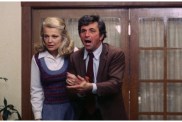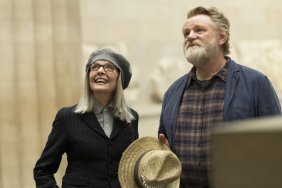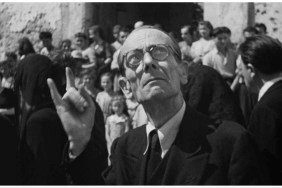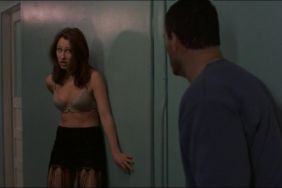It has been just four years since comedy writer and producer Judd Apatow made his feature film directorial debut with The 40-Year-Old Virgin. Two movies later, he’s already delving into deeper and darker territory with Funny People, his first official pairing in a director to actor capacity with his long-time friend and collaborator Adam Sandler, who he’s known since his days doing stand-up.
Sandler plays George Simmons, a superstar comic actor with a background in stand-up (much like Sandler) who takes on a young comic named Ira (Seth Rogen) to help him write some jokes for his return to doing stand-up. George recently learned that he’s dying and Ira is the only one he confides in with this information as well as his secret hopes of getting back together with his ex-girlfriend (Apatow’s wife Leslie Mann), who is now married with two kids to a boisterous Australian businessman, played by Eric Bana.
It’s been a long road for this interviewer to finally have a chance to talk to Judd, having spoken to almost all the directors he’s produced in the last four years as well as his wife. We were ready to do whatever it took to finally interview him… and as we sat in a noisy New Zealand-themed outdoor bar in Toronto trying to conduct the interview, it really felt worth it to finally get a chance to tap into the brain of the current King of Comedy, even if it wasn’t the optimum venue.
ComingSoon.net: I understand you just appeared on Conan, right?
Judd Apatow: Yes, I did.
CS: Cool, I appreciate Conan being my warm up act, but it’s great to see them bringing filmmakers on the show, rather than just the usual, which would be to get Adam and/or Seth. I know you’ve known Adam for many, many years since your standup days. Did you have him in mind for the role of George Simmons when you started writing this and how did that come about?
Apatow: Well, I showed Adam a DVD of “Knocked Up” before it came out and he said afterwards that he loved it and that he wanted to be in the next one and was like “When will we start?” So I had some ideas that could apply to Adam and I had this idea for a long time to do a movie about when I first started doing comedy and how I so enjoyed getting to know all the older comedians. I suddenly realized I could combine that idea with another story I was working on about people who are sick and then get better and they’re a little more confused after they get better than they were when they were sick.
CS: When he said he was interested in doing something, did you just pitch him on the idea or did you wait until you had a script?
Apatow: I talked to him a little about the basic idea which was about an isolated comedian whose dreams come true and when he gets sick, he realizes that he doesn’t have anything of real value. He’s not surrounded by friends and family. In fact, when he finds out he’s sick, he literally has nobody to call.
CS: I think some people might see Adam’s character and maybe Paul’s character from “Knocked Up” as being some part of yourself, especially since you have your own family playing theirs. I wonder how that came about that Leslie and your kids ended up in those roles.
Apatow: What happens is there’s a little bit of truth in all of the characters. While I was making the movie, I came to believe that Seth’s character is the one most like me, but then I realized sadly that I’m probably closer to George than Ira.
CS: Back in your days doing stand-up, did you ever get called upon as a joke writer for a bigger comedian that might have been a similar situation to the one Ira is in?
Apatow: I usually helped them write and produce their HBO or Showtime comedy specials and I spent a year writing Roseanne’s act, and I wrote three Tom Arnold specials. I worked on the Grammys when Gary Shandling was the host, I co-produced Jim Carrey’s Showtime special. There were two guys who were comedians to get some support when they were heading into those projects. Both of them were incredibly nice to me. That’s why I never wrote about it because nothing dramatic ever happened, so it took me a while to fabricate something interesting enough to make it work.

CS: There’s gotta be the bigger guys who find new talent to write for them, and obviously, someone dying of a disease is very specific, but did that come from anything that happened to someone you knew?
Apatow: Yeah, I think that relationship on one hand is one that a lot of comedians have, but comedians of all ages hang out together, but they’re not different ages. When you’re 20 years old, you’re seen somewhere and you’re 30, 40, 50 years old and everybody accepts each other as the same age. That’s what’s wonderful about it. There’s nothing more exciting for me and Adam than to go to the Improv at night and be allowed to sit with the owner Bud Friedman when he was talking to Jerry Seinfeld and Paul Reiser and George Wallace. Our dream was to be allowed to hang out with those people.
CS: Doing a movie set in the world of stand-up is very specific. Have you found in your test screening process that people are able to understand and relate to people who work in that profession?
Apatow: I think people like seeing the sub-culture that they don’t know a lot about. It’s fun to see how the comedy subculture works. It’s also interesting because everyone is funny and trying to be funny, although they’re talking about something serious, there are actually a lot of funny moments.
CS: As far as your working relationship with Adam, besides being friends, did you ever work with him on this level besides writing scripts like “Zohan” for him. How did he adjust to having you direct him and throwing lines his way? Was it an easy and fluid transition?
Apatow: Over the years, we’ve worked together a bunch of times. I did punch up “The Wedding Singer” and “Happy Gilmore”–I wrote a couple of scripts that he wound up not making, but I went to a lot of previews when he was first showing his movies and he would do the same for me. I was never in a position where I could hire him as an actor, and it took me a long time to have some successful films where I could make a movie like this with a studio, but I probably did have to earn the right to make this kind of film.
CS: I know you like to use the line-o-rama process where you throw out lines to your actors after shooting the written script. I don’t know how Adam tends to work, but I assume he does a lot of improv as well. Was it easy for him to work in your system and have the two styles mesh fairly easily?
Apatow: Yeah, absolutely. I used to work with Adam in the past, so it wasn’t any problem at all. He’s not known as a person to do that much of it, but he quickly got in the groove and had a blast, and there are so many moments in this movie that could never have happened if I didn’t take the handcuffs off and let these guys actually mix it up a bit. Adam is very collaborative and we really worked on this material. I try and figure it out a year before we started shooting so I was able to talk with him easily for a year before the first day of shooting. By the time we got there, we had a ton of other ideas on top of everything that was kicking around.
CS: Seth Rogen’s career has really been quite amazing since you first started working with him on “Freaks and Geeks” and then we saw him in the smaller role in “The 40-Year-Old Virgin.” Now, he’s writing his own movies and I’m sure he’ll be directing eventually. Did you see that aspect of his abilities when you first started working with him?
Apatow: It’s funny. When we were doing “Freaks and Geeks,” he started showing us some writing he was working on, and it was really very strong and he was 17 years old. But when we improvised, that would really come out, you could tell that he had a writer’s mind. That’s why I hired him to be a writer on “Undeclared.” I thought that he could make sure the voice of a young person was accurately portrayed then I realized that he’d never actually been to college, so he could be the voice of the people who went to college and be really funny. I also like movies that have non-traditional leads, sort of old movies to new movies. I like Buster Keaton, Jerry Lewis, Don Knotts, Bill Murray, kind of people.

CS: Paul Giamatti is another example of that. A character actor who people love as a lead because they’re more like us, and Sandler’s kind of like that, too.
Apatow: That’s the reason. They may not be conventional leads in movies in which they save the world, but human comedies should be starring (these kinds of actors).
CS: I’m also interested in your role as mentor, because I’ve talked to Jonah and Bill Hader, who are both writing projects, and it’s not something we see very often in the comedy world, directors who do their own thing but also prompt their actors to write their own material. Can you talk about that a little, your role as mentor, if that’s a proper term?
Apatow: I think that it’s much easier if you can grab the reins of your career, the best way to do that is to learn how to write. That’s why those really funny lead actors have some ability at it and if they develop it, their careers get much easier when they self-generate. It’s rare to find in that big stack of comedy scripts, one that’s ready to shoot. I think it’s much better when they’re tailored to the actors, so I urge them from day one to get involved in that process.
CS: When you were writing the movie, did you have a lot of the actors already in mind, whether it’s Jason Schwartzman, who is new to your world, or Jonah Hill, who has appeared in your previous movies?
Apatow: I try to know essentially all the parts before I start writing. The only person that wasn’t cast before I started writing was Eric Bana, but everybody else was cast while I was writing and as soon as I finished writing, I gave my first draft to Eric Bana. I was like, “Here’s what we’re trying to do,” and he joined on right away.
CS: I think he’s really a breakthrough in this, and it’s strange to have an actor who’s been around so long to finally be given a chance to do comedy despite that being where his career originated. Did you any of his stand-up work before you sent him the script?
Apatow: I’d seen a lot of his work on YouTube from when he did stand-up and he couldn’t be funnier in “Chopper,” so it seemed like an original way to do this type of snarky business man character in the way he’d kind of done before.
CS: One of the things studios like about comedies is that they can be made fairly inexpensively and make a good amount of money if they’re even remotely successful. This being your third movie, is it getting to the point where you want to start making movies with bigger budgets so that you could work more comfortably?
Apatow: I want to make the best possible version of the movie. I enjoy making little, scrappy comedies, but it was clear that the scope of this movie was too big to do it that way ’cause I wanted the movie to be in the world of a very rich guy. To rent a house to shoot that looks like it was pretty expensive and shooting it correctly so it looks gorgeous was very expensive. We tried to make a gorgeous-looking movie, that’s why we hired Janusz Kaminski, so as you can see how big George’s world is, the interior life is a disaster and everything that he yearns actually doesn’t bring him any joy.
CS: I’ve talked with most if not all of the directors you’ve produced over the last five years, and they’ve all said that having you as a producer makes it easier for them to accomplish and get things they need. When you’re directing a movie, do you have to switch off that side of yourself in order to focus more on the creative side?
Apatow: Well, I had Barry Mandel, who produced “Munich,” and Clayton Townsend who produced my other two movies, so production-wise, it’s not that difficult to remove issues. We just thought through way in advance in prep that it never gets that complicated. We never worried how we’re going to sink the gigantic ship, so our productions aren’t that hard. It’s really about managing time and having the time for the actors to play.

CS: From talking to these directors, I get the impression you’re really big on doing test screenings, but when you’re actually putting together your first cut, how do you decide which of the funny improv stuff to keep and what to let go? There always seems to be a lot of equally funny stuff on the DVDs.
Apatow: I have two editors and for this movie, I had three because of the enormous amount of film, and they go through it all, and very quickly, the movie reveals itself to you. My first cut was like three hours and 14 minutes, but as you watch it, you say, “Okay, I don’t need this, I don’t need that,” and you start making changes and before you know it, it’s revealed itself. There is that moment when you start cutting it even shorter and suddenly, it’s not working as well. I did seven test screenings, because I wanted to make sure audiences really loved the movie. The subject matter was challenging and for me, the movie would work if the audiences loved it, so I wanted it to be a funny and entertaining movie with more emotional moments than we usually have.
CS: Has that process changed a lot since making “The 40-Year-Old Virgin” and doing your TV stuff?
Apatow: The process is pretty much exactly the same, but I trust it a little bit more than I used to. I think what we’re doing with the films, each project is a little different. Some projects really require a lot of playing, and there are projects where we know exactly what we need to do. The main goal is that it’s a collaboration and that everyone who’s involved with the movie can make constructive contributions.
CS: You’ve very much been at the forefront of a resurgence in R-rated comedy, as I remember just five years ago when movies like “Harold & Kumar” and “Eurotrip” just weren’t working in terms of making money and studios were nervous to make R-rated comedies. Even Kevin Smith, who had been doing R-rated comedies for many years, has never been able to get over that $30 million hump in terms of box office gross. You turned that around and now even romantic comedies like “The Ugly Truth” are going that route. Can you talk about why you decided to work in the R-rated realm when you started making movies and how you convinced the studio that you could make it work?
Apatow: I worked at “The Larry Sanders Show” which allowed people to speak the way they actually speak rather than constantly looking for ways to remove all of that or water it down. For me, it’s telling reality the way it is. Half of my day is R-rated and I don’t think it’s interesting to try to hold it to a PG-13 unless there’s a real specific reason for it.
CS: “The Larry Sanders Show” is a great example of an early cable comedy that showed the difference between cable and network in terms of quality. Do you think that cable shows with coarser language are being accepted more by audiences these days because the writers are allowed more of that freedom?
Apatow: Yeah, I think that the best shows are allowed the freedom and that’s why shows like “The Wire” and “The Sopranos” are great. For a long time, a lot of the best comedy was happening in R-rated dramas.
CS: As far as the various projects you have in the works, are there movies with other directors you might have ready to go into production soon? I know “Get Him to the Greek” is probably close to done or in post-production now, but anything else you have that might be going into production pretty soon?
Apatow: That’s going to shoot until the end of summer, and then next summer, we’re going to shoot a movie that Kristen Wiig wrote for herself. That’s next summer and then we’re developing a movie for Bo Burnham, and Bill Hader has a movie (the slasher flick “House of Joel”). Kimberly Peirce (is writing something) I think, and we have a movie with John Carney, the guy who made “Once” writing and directing, so hopefully, as soon as I’m done and have a little break, I can help people with their scripts and help to kick things around.
Funny People opens nationwide on Friday, July 31.









